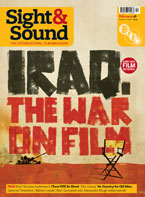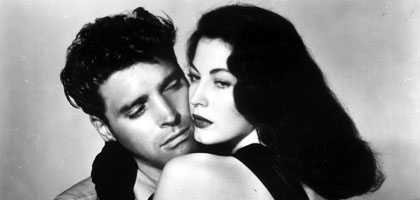Primary navigation


A former acrobat with a firm grasp of economics, Burt Lancaster had great acting abilities that were reckoned by some to be based on his multiple personalities. But above all he conveyed a unique sense of male mystery. By Philip Kemp
In Louis Malle's Atlantic City, U.S.A. (1980) Burt Lancaster plays Lou Pasco, a former small-time mobster washed up in the New Jersey seaside resort, living on numbers-running and fantasies of his one-time intimacy with the big boys - Al Capone, Lucky Luciano, Dutch Schultz.... Showing a young punk round the town, Lou laments its decline from its glory years. "I never even seen the Atlantic Ocean until now," observes the young guy. "Well," responds Lou, "you should have seen the Atlantic Ocean in those days."
It's a throwaway line, and most actors would probably toss it off with a dismissive shrug. But Lancaster doesn't. Instead, he turns and looks back at the waterfront as he speaks, with a movement of his shoulders that half-hints at an embrace - as if he's giving the Atlantic one last chance, and then forgiving it for its shameful loss of glamour. It's a reading that conveys at once pathos - Lou's delusions extending even to the sea - and generosity.
Through all Lancaster's best roles - and through his own personality - there runs this element of ambiguity. Lindsay Anderson spotted it early on, noting "this odd mixture of violence and decency, this goodwill that has not quite found a satisfactory channel of expression." Put certain descriptions of the actor side by side and it's hard to believe they're referring to the same person. Andrew Collins recently summed up the dominant features of Lancaster's face as "the jutting jaw and the pleading, kind eyes". Norman Mailer wrote of "the coldest eyes I've ever looked into."
Clifford Odets, who worked with Lancaster in the 1950s, went even further, laying him out as a sevenfold case of Multiple Personality Disorder. "No.1 is Enigmatic Burt, the Inscrutable One, of whom a prominent Hollywood psychoanalyst once said, 'That man gives me the creepiest feeling that I am in one room and he is in another'. No.2 is Cocksure Burt, a man of total self-confidence, tinged with faint mockery and an edge of contempt. No.3 is Wild Man Burt, a creature of enormous enthusiasms, exuberance and inexhaustible energy. No.4 is Old Father Burt, a kindly paternal character who appears when older or weaker persons are present. No.5 might be labelled 'Mr Hyde' - cutting, searing Burt, who is remarkable not so much for his vulgarity - which can be spectacular - but for the destructive quality of his cruelty. No.6 is the Marquis de Lancaster, a distinguished gentleman of the old school, rather mincing and prancing, who talks as if he'd just stepped out of the Congress of Vienna. No.7 is Snake Oil Burt, conman, mischief maker and light-hearted rogue."
Odets seems to have been describing Lancaster as a person rather than in terms of the roles he took. But his enumeration would suit either very well, and it's not hard to link movies to the categories. No.3 would take in the early swashbucklers - The Flame and the Arrow (1950) or The Crimson Pirate (1952). No.6 is clearly The Leopard (1963), No.7 equally unmistakably Elmer Gantry (1960). Even so, Odets missed out at least one manifestation that underlies several of Lancaster's finest performances: Wounded Burt, all the more touching by contrast with the man's powerful physique, the broad shoulders slumping and the dangerous eyes gone liquid and helpless. It's there in Atlantic City USA, in The Swimmer (1968), in the final scene of Sweet Smell of Success (1957) - and even in his debut movie, Robert Siodmak's The Killers (1946).
Lancaster came to screen acting late. He was born in East Harlem, a tough neighbourhood, predominantly Italian and a breeding ground for incipient goodfellas. As a boy he was a voracious reader and loved opera - but he started out as an acrobat, quitting New York University, where he was a basketball star, to join the circus. He developed a daredevil trapeze act with Nick Cravat - who later appeared with him in several films - and continued to perform it as late as 1949, well after he became a major star. Christopher Lee, who took a small role in The Crimson Pirate, recalled: "I don't think I've ever seen a better co-ordinated man." And right into old age he moved with cat-like grace.
By the time Lancaster appeared in The Killers he was 33. As the Swede, an ex-prize fighter passively awaiting death at the hands of the eponymous hitmen, he was already showing the ?ipside of his dominant physical presence. The very first time we see him on screen, he's lying on his back in the dark - not hiding, but simply succumbing to the blackness he knows he can't escape and won't even trouble to resist.
In real life, though, Lancaster was being anything but passive. For The Killers he'd teamed up with Harold Hecht, an ambitious New York agent, and within a year they'd formed a partnership that became Hecht-Hill-Lancaster after they were joined by producer-writer James Hill. Not since Chaplin, Fairbanks, Pickford and Griffith launched United Artists in 1919 had an independent combine exerted such muscle against the power of the studios. In 1957 it was even suggested that H-H-L should take over the running of MGM (though the idea was defeated by a majority of parent company Lowe's shareholders), and the organisation's success not only inspired other stars - Kirk Douglas, Tony Curtis - to set up their own independent companies but led directly to the rise of king-agents such as Lew Wasserman.
The arrangement delivered substantial tax savings, besides enabling Lancaster to secure much better terms from the studios. He is said to have invented the concept of 'percentage points' - fixed percentage shares in the gross profits of a movie - and in 1959 became the first actor to be offered $1 million for a single film, the title role in Ben-Hur (which he then turned down). But his motives for setting up the partnership with Hecht weren't primarily financial. Following The Killers, Lancaster found himself typecast as a neurotic tough guy, his eyes forever shaded by a snap-brim hat. With his growing power as an independent, and backed by Hecht's shrewd deal-making, he could break away from formula and explore a multiplicity of roles, including those no big studio would ever allow a contract star of Lancaster's stamp.
He made swashbucklers with Nick Cravat that were sheer self-indulgence, aerial pyrotechnics for the hell of it, with Lancaster showing off by doing his own stunts. They're redeemed by the infectious sense of enjoyment he brings to them, exuberance unleashed. They also allowed him to slip in something of his political principles: his heroes are always aiming for something beyond revenging a wrong or getting the girl - they're out to overthrow a repressive tyranny. A lifelong leftist, Lancaster resisted pressure to sign a loyalty oath during the McCarthy era and for years found himself under investigation by the FBI.
Those swashbucklers gave free rein to the barnstorming hamminess in Lancaster's acting, the larger-than-life gestures and the wide toothy grin that earned him the nickname 'Crockery Joe'. He could turn this side of his persona to good use, as in his megalomaniac general in Seven Days in May (1963) or his Oscar-winning portrayal of the con-artist preacher, hyped up on the power of his own verbal charlatanry, in Elmer Gantry. But in the same film he's capable of toning right down to the tenderness of his scenes with Jean Simmons. Lancaster, though often accused (both on and off set) of control-freakery, was always ready to learn from other actors. Cast opposite Gary Cooper in Vera Cruz (1954), he worried that Cooper seemed to be doing nothing in front of the camera, until he saw the first three days' rushes. Then, realising that Cooper had gauged it right while he himself was overacting badly, he insisted on reshooting all three days - at his own expense, since it was a Hecht-Lancaster production.
When Lancaster entered a room, Alexander Mackendrick once remarked, "the room temperature rises... There's that sense of something unpredictable." Lancaster's rages - and on occasion physical brutality - were legendary. Mackendrick liked to tell the story of how Lancaster was once having an argument with Harold Hecht. Hecht, a small, neurotic man, refused to give way, so Lancaster picked him up by his lapels and held him out of the 15th-?oor office window. "After a bit," Mackendrick would add, "Harold saw Burt's point of view." (Lancaster apparently pulled the same stunt while shooting 1970's Lawman, holding director Michael Winner over the edge of a cliff.)
The more quietly the power and danger in Lancaster's persona are deployed, the greater their effect. In Mackendrick's Sweet Smell of Success, his reputation-shredding columnist J.J. Hunsecker speaks in calm, measured tones, all his movements reined in and closed off, his arms rigid with the tension of a powerful man channelling his force into devious psychological outlets. As a result, his final eruption of violence when he beats up Tony Curtis' Sidney Falco comes not as an expression of strength but as an admission of weakness, the circumscribing of infinite potential damage into the merely limited and actual.
Lancaster's subtle performance in Sweet Smell - not to mention the gentleness of his lifer in Birdman of Alcatraz (1962) or the pathos of his alcoholic husband in Come Back Little Sheba (1953) - makes it all the more surprising that Visconti was initially so opposed to casting him as the Prince in The Leopard, seeing him merely as a "cowboy actor, gangster, terrible, ridiculous". Visconti, who had originally wanted Olivier or Brando, was later frank enough to admit his mistake. Lancaster, with his usual thoroughness, read not only Lampedusa's novel but volumes of Italian history, and even dubbed he brings to the role an instinctive nobility coloured by regret at the deterioration he sees but cannot stem. There's something of the same quality in his veteran scout McIntosh in Ulzana's Raid (1972), too clear-eyed to deny that things are going steadily from bad to worse and too wearily fatalistic to try to prevent them.
"Burt, once in a while you hit a note of truth and you can hear a bell ring," Shirley Booth, Lancaster's co-star in Come Back Little Sheba, told him. "But most of the time I can see the wheels turning and your brain working." That over-thought-out, control-freak side of him is perhaps what prevented the success of his two forays into directing: The Kentuckian (1955) and The Midnight Man (1974) are both intelligent, competent ventures, but a little too calculated. And the teaming for which he's best remembered - with Kirk Douglas in Gunfight at the O.K. Corral (1956), Seven Days in May, Tough Guys (1986) and several more - though entertaining and generally good box office, produced some of his least interesting work. By contrast with the yin-yang clash with Tony Curtis that fuels the con?ict in Trapeze (1956) and Sweet Smell, Lancaster and Douglas are too similar as actors (all those teeth) to strike more than superficial sparks.
Even so, Lancaster rarely took the easy route, and there's a mix of audacity, conscience and sheer enjoyment in his filmography that, among present-day actors, perhaps most closely anticipates George Clooney. Alexander Mackendrick had reason enough to resent Lancaster - constant battles through one film, thrown off the other (The Devil's Disciple, 1959) - but he paid him a generous and perceptive tribute. "Stars," he wrote, "are uninteresting monoliths that never change. Burt was better than a star. He had a moral courage in playing roles that are quite against any star image."